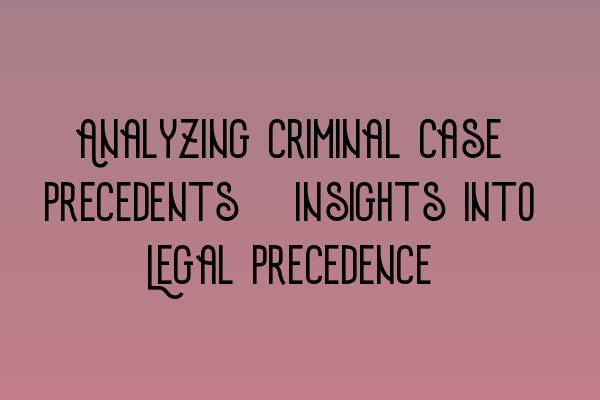Analyzing Criminal Case Precedents: Insights into Legal Precedence
When it comes to understanding criminal law and legal precedence, analyzing criminal case precedents can provide valuable insights. Criminal case precedents play a pivotal role in shaping the legal landscape, influencing future cases, and guiding legal practitioners in their decision-making process.
In this article, we will delve deep into the importance of analyzing criminal case precedents and explore how they can offer valuable lessons for aspiring criminal law professionals. Whether you are studying for the Solicitors Qualifying Examination (SQE) or practicing criminal law, understanding legal precedence is crucial to success.
The Significance of Criminal Case Precedents
Criminal case precedents, also known as legal precedents or case law, refer to previous decisions made by higher courts that establish a binding rule for future cases with similar legal issues. These decisions create a framework for legal interpretations and lay the foundation for consistency in the application of the law.
By scrutinizing criminal case precedents, legal practitioners gain a comprehensive understanding of the key principles, legal reasoning, and judicial interpretations that have shaped criminal law. This analysis allows them to predict how future cases may be decided and allows for informed decision-making, thus ensuring justice is served.
The Process of Analyzing Criminal Case Precedents
Effectively analyzing criminal case precedents requires a structured approach. Here are some steps you can follow to gain valuable insights:
- Identify Relevant Precedents: Begin by identifying precedents that are relevant to your case or legal issue. This could involve searching through legal databases, reviewing legal journals, or consulting with experienced legal professionals.
- Read and Understand the Precedents: Once you have identified relevant precedents, carefully read and analyze them. Pay attention to the key issues examined, the legal principles applied, and the reasoning behind the court’s decision.
- Compare Similarities and Differences: Compare the facts and legal issues in the precedents with your own case. Identify similarities and differences, and consider how these may impact the outcome of your case.
- Evaluate Applicability: Assess the applicability of the precedents to your case. Consider whether they support or contradict your arguments and determine their persuasive value.
- Examine Any Overruled Precedents: Look for any overruled precedents that may affect the current legal landscape. Understanding the reasons behind the overruling can provide insights into the evolution of legal principles.
By following these steps, legal practitioners can gain a comprehensive understanding of the legal precedents relevant to their case and use them as a foundation for their legal arguments.
Insights and Lessons from Criminal Case Precedents
Studying criminal case precedents offers valuable insights and lessons for legal professionals. Let’s explore some key takeaways:
- Establishing Legal Precedence: Criminal case precedents play a crucial role in establishing legal precedence. By studying previous decisions, legal practitioners can identify the key elements that contributed to the establishment of a legal rule. This knowledge can guide them in building persuasive arguments and presenting their case effectively.
- Understanding Judicial Reasoning: Analyzing criminal case precedents allows legal professionals to understand the reasoning behind a court’s decision. By dissecting the legal principles and arguments employed, practitioners can develop a deeper appreciation for the law’s application in different scenarios.
- Predicting Case Outcomes: Criminal case precedents enable legal professionals to predict the potential outcomes of similar cases. By analyzing the facts, issues, and legal principles in previous cases, practitioners can make informed predictions and advise their clients accordingly.
- Guiding Legal Research: Criminal case precedents serve as a guide for legal research. They provide starting points for finding relevant legal authorities, such as statutes, regulations, and other case precedents that may further support arguments.
In summary, criminal case precedents offer valuable insights into legal precedence, enhance understanding of judicial reasoning, and help legal professionals predict case outcomes. Effectively analyzing and utilizing these precedents can significantly impact a legal professional’s ability to make sound arguments and achieve desired outcomes.
If you are preparing for the Solicitors Qualifying Examination (SQE) or seeking reliable resources related to criminal law, explore our comprehensive SQE 1 Practice Exam Questions and SQE 1 Practice Mocks FLK1 FLK2. These resources are designed to test your knowledge and familiarize you with the examination format.
For those preparing for the SQE 2 exam, our SQE 2 Preparation Courses provide comprehensive coverage of the relevant topics and guide you towards success.
Additionally, if you are interested in comprehensive preparation for the SQE 1 exam, we offer SQE 1 Preparation Courses that equip you with the necessary knowledge and skills to excel in the examination.
Stay updated with the latest SRA SQE Exam Dates to plan your preparation effectively and ensure you are well-prepared for the examination.
Remember, analyzing criminal case precedents is not just an academic exercise; it is a skill that requires regular practice. By effectively analyzing legal precedents, legal practitioners can make informed decisions, better represent their clients, and contribute to the development of a just legal system.
